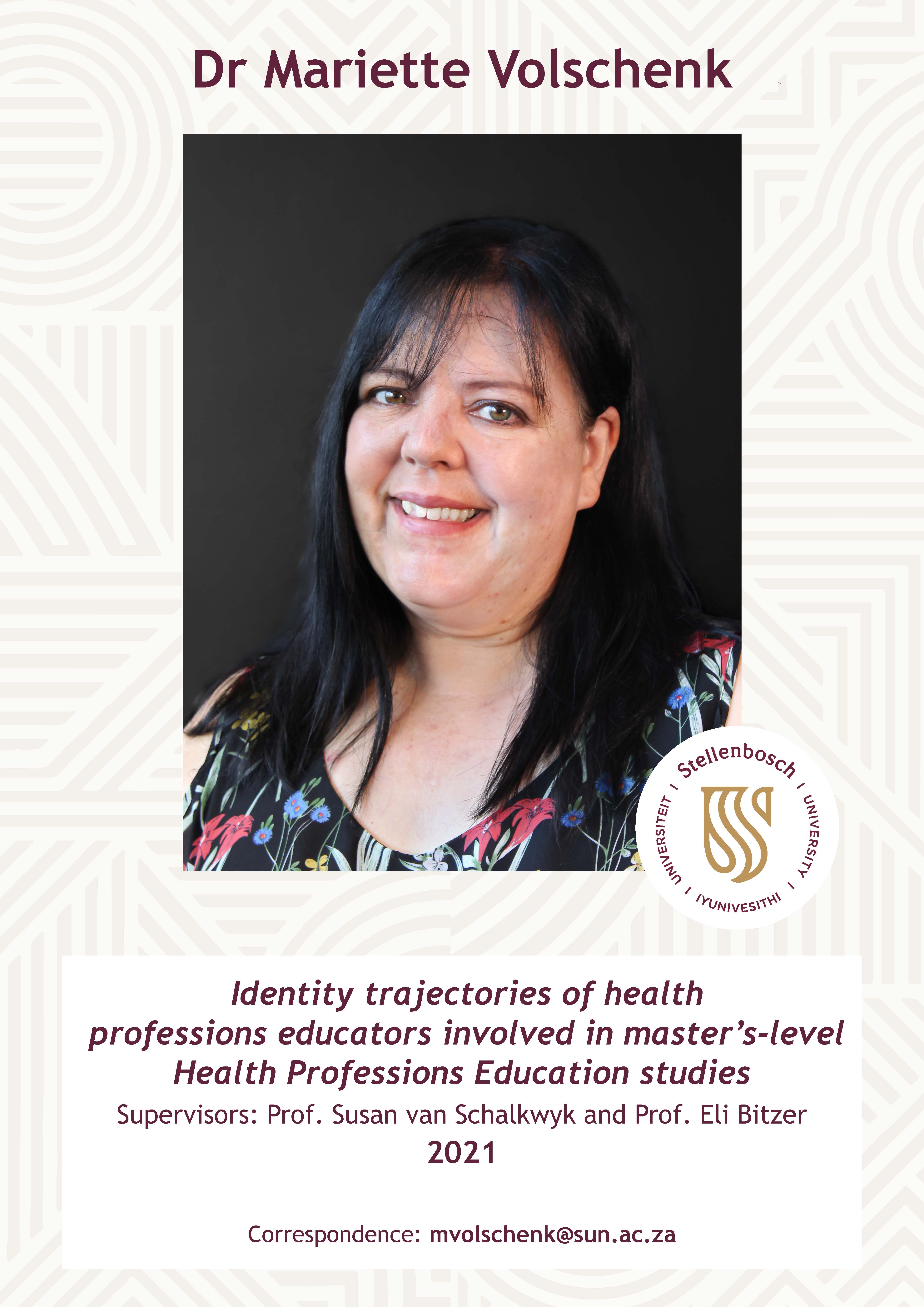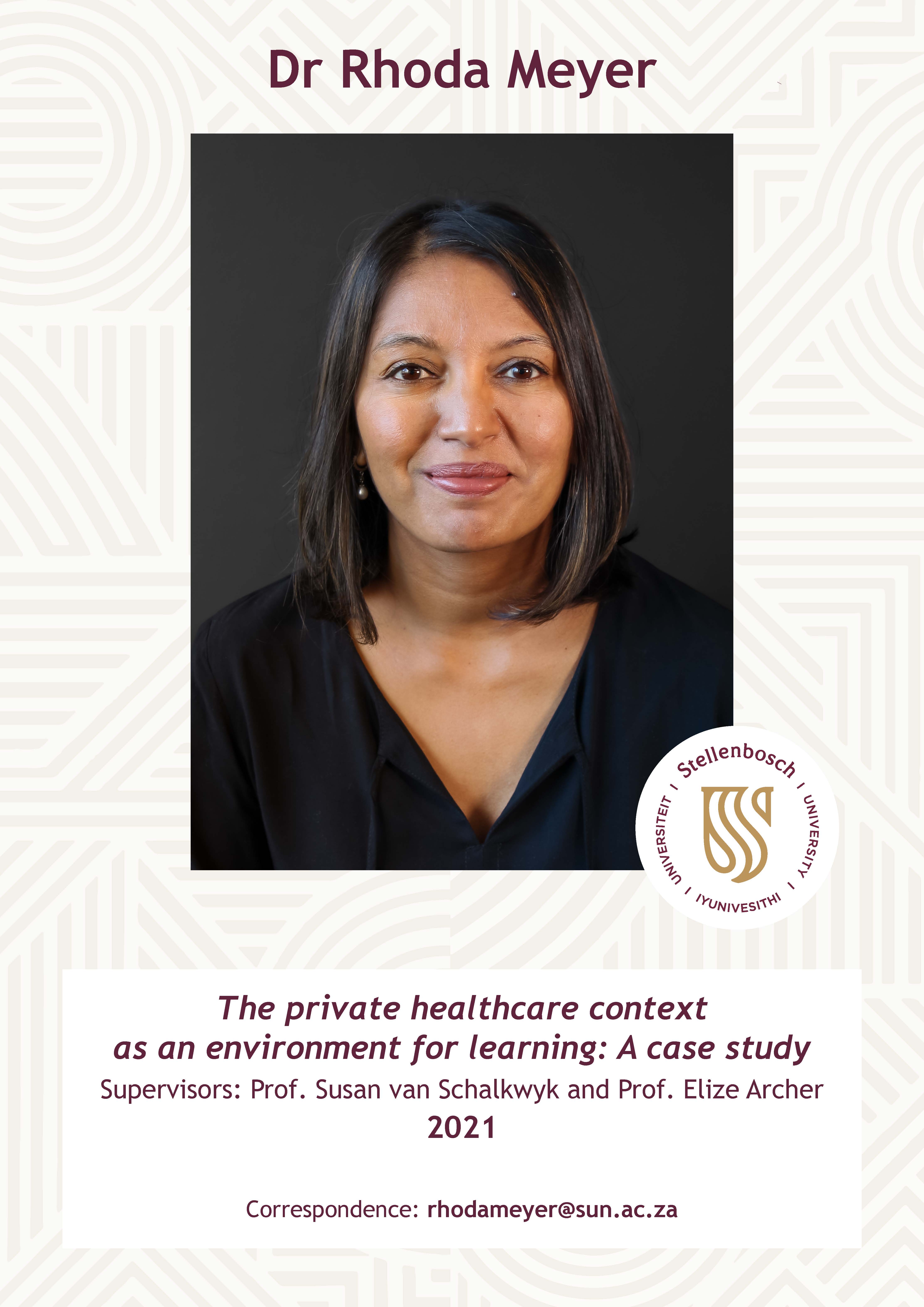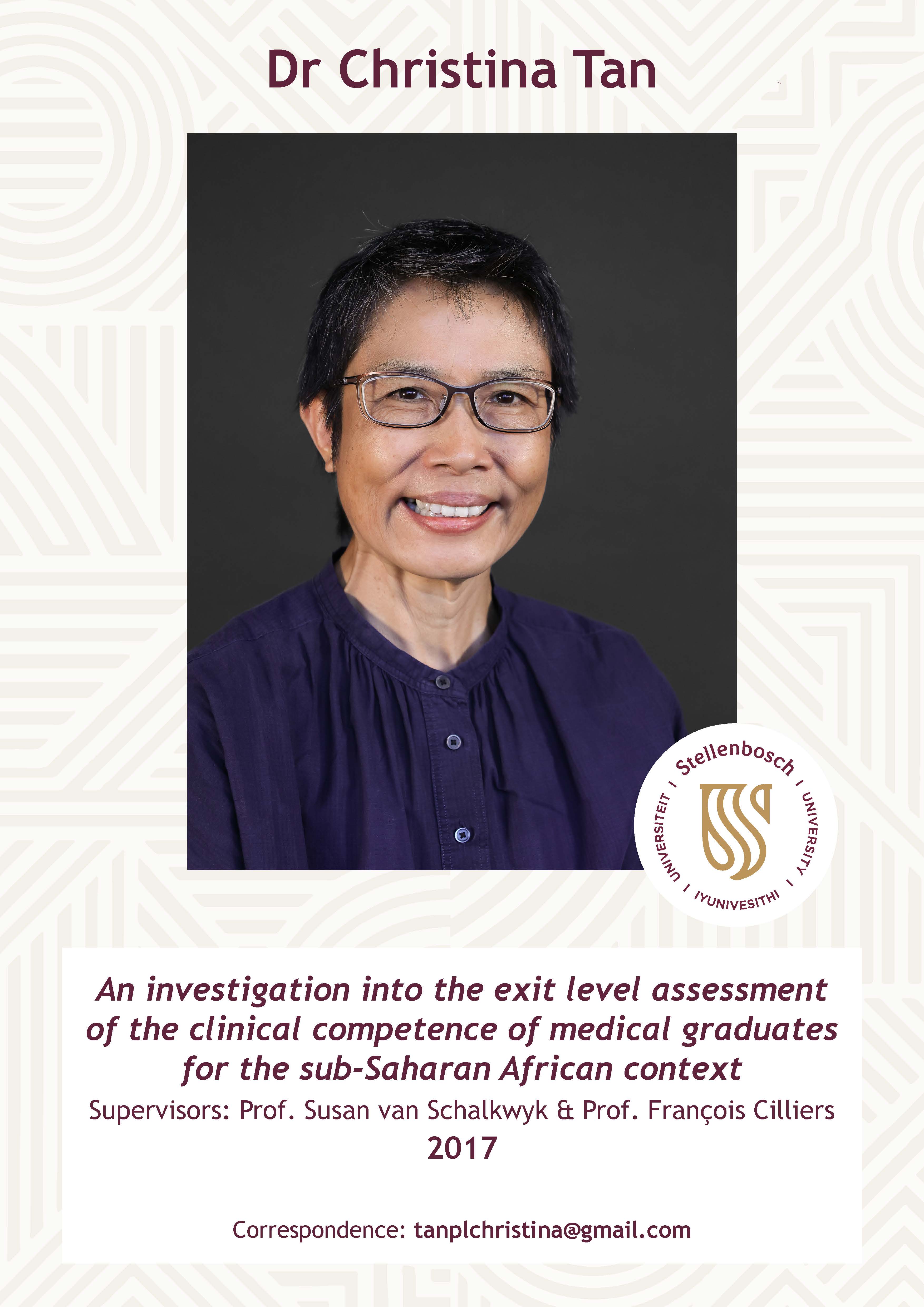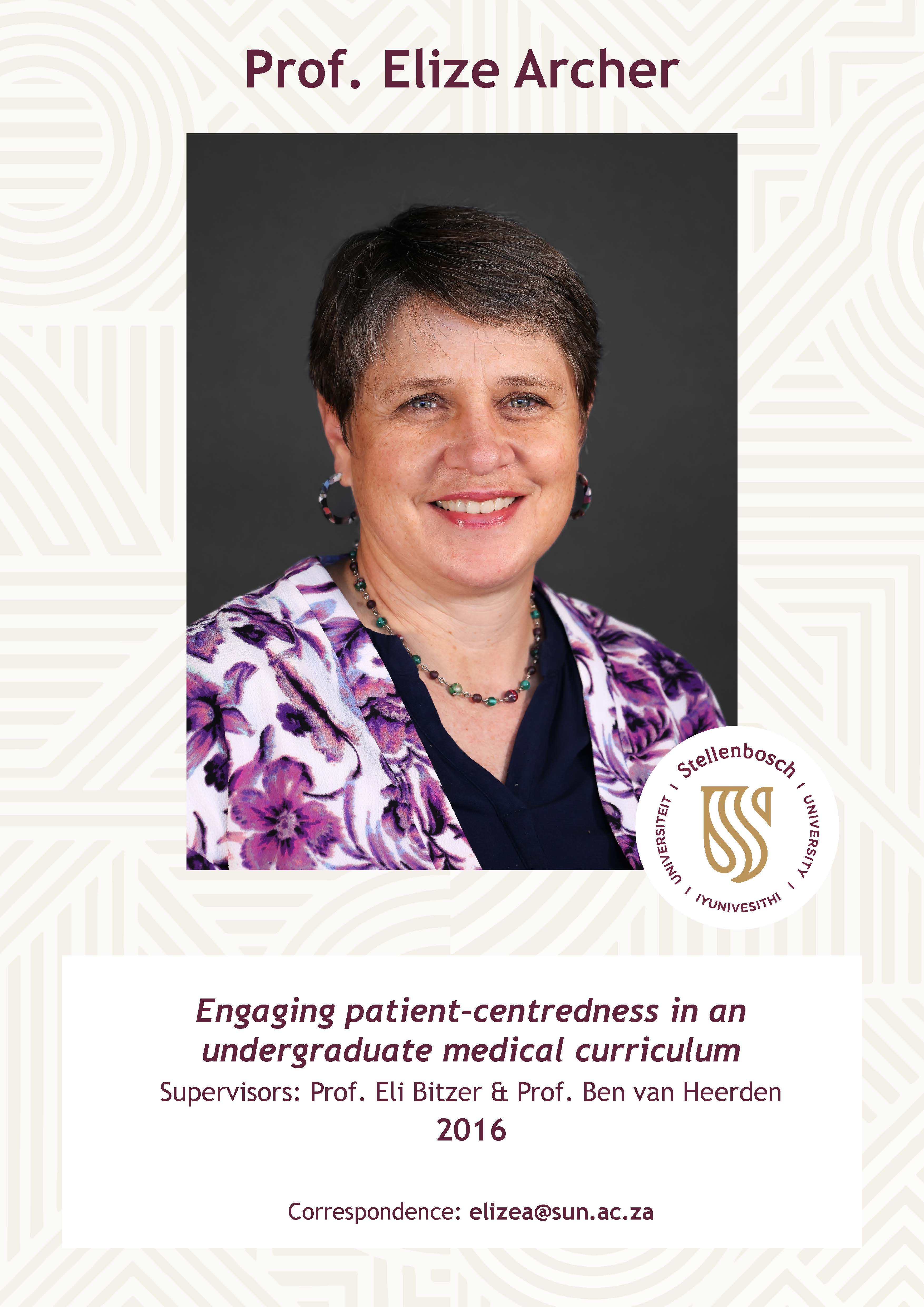???????????????????????????Centre for Health Professions Education
?Meet our PhD graduates
?
?2021

Tell me something interesting about you
In my spare time I am a keen hobbyist lifestyle and landscape photographer.
What is your thesis about
My thesis is about the identity journeys of health professions educators who undertake Master’s in Health Professions Education (MHPE) studies. Drawing on Landscapes of Practice as theoretical framework, this multiple case study employed narrative interviews and self-portrait drawings across two data collection periods to gain an improved understanding of the factors that enable or constrain the identity construction of emerging educational scholars and leaders in the context of MHPE studies
Can you share some of your most interesting results
This study provides new insights into the sociocultural dimensions of becoming a master in Health Professions Education (HPE) and identifies several factors that may enable or constrain the development of educational leaders and scholars in the context of MHPE programmes. Findings show that MHPE studies involve multiple transitional layers, including expert to novice shifts, shifts in knowledge paradigms, shifts from disciplinary silos to interprofessional learning, and misalignment between individual professional development goals and MHPE programme goals. Students’ underpreparedness to navigate these transitions may result in changing perceptions of competence, which has implications for the construction and sustainability of the master in HPE identity. The influence of institutional culture on the sustainability of the master in HPE identity after completion of studies was highlighted by the fact that most MHPE graduates experience limited agency in enacting their master in HPE identities and education scholarship agenda in the disciplinary workplace.
How can this knowledge contribute to the HPE field
This study was the first known empirical research into the identity trajectories of health professions educators involved in MHPE studies in the sub-Saharan African context. The thesis provides new ways of theorising how the Master in HPE identity is constructed, questioning notions of transitioning from one identity to another, and suggesting that health professions educators straddle the boundaries of two epistemologically and ontologically diverse communities of practice. The findings underline the value of a reflective practice framework, effective supervisory practices and an overt focus on identity learning to foster transformative learning in MHPE students. It also suggests that MHPE course facilitators and research supervisors need to recognise the disciplinary workplace as a site of professional socialisation and evolving professional identities. Moreover, the study calls on academic health centres to create opportunities for graduates to enact their educator identities and follow educational scholarship and leadership trajectories that may directly influence the HPE professionalisation agenda.
What are your plans going forward
I would like to conduct a Delphi consensus study with key international MHPE scholars to explore the criteria of a masterness framework for MHPE programmes and develop pedagogical guidelines to support the professional learning and identity construction of future educational leaders and scholars involved in MHPE studies.
One key lesson / pearl of wisdom you took from the PhD journey
Life is short. Work hard on completing your PhD studies, but always make time for self-care and family.
?

Tell me something interesting about you
Although I love research and reading literature related to my professional interests, I make it a point of reading other forms of literature, such as poetry, and historical fiction novels, e.g. The Book Thief. I also enjoy cooking and baking, as well as listening to music and on rare occasions, playing the piano.
What is your thesis about
My study is about the private healthcare context as a learning environment and how this influences the learning experiences of students, specifically nursing students. This case study was set within a specific context, allowing me to undertake an in-depth exploration into what factors within the environment influence learning experiences. A number of recommendations were made that may be useful for other HPE learning contexts.
Can you share some of your most interesting results
The findings from this study highlight a number of key issues, namely that the private healthcare learning environment is characterised by various tensions created by different priorities. Secondly, this environment consists of various contextual variations that require training sites to be flexible. Thirdly, the learning environment has various systems and sub-systems of culture, creating a high level of complexity. In the fourth place, this space consists of multiple roles that give rise to various conflicts, and lastly this environment is characterised by a structured hierarchy that has the potential to influence the interactions between the students and the learning environment.
How can this knowledge contribute to the HPE field
As health professions education negotiates a period of transition, this study is important for providing insight into what the current private healthcare environment has to offer teaching and learning. Although this study was undertaken in one private healthcare context, the principles can be applied to other private healthcare contexts. It is also possible that challenges related to the environment faced by these students may also be relevant to other HPE settings.
What are your plans going forward
My plan in terms of my professional development is to undertake further research in the field of health professions education, in order to make a valuable contribution. I aim to increase my collaboration with others in the field, to build strong partnerships while learning from them.
One key lesson / pearl of wisdom you took from the PhD journey
Although the PhD journey is riddled with challenges, see it as a fertile ground for your personal and professional growth. Like many, your great story will happen when you choose not to give up, despite the circumstances.
2017

Something interesting about you
I am based at Universiti Malaya in Kuala Lumpur, Malaysia, and am a family physician by training. My interest in health professions education goes back more than 25 years. In 2005, at a FAIMER (Foundation for the Advancement of International Medical Education and Research) fellowship in Philadelphia USA, I met and got to know two South African fellows who invited me to visit their country. That’s how it all started – how I fell in love with South Africa and eventually ended up at Stellenbosch to pursue the MPhil and eventually PhD in Health Professions Education.
What is your thesis about
Against the backdrop of the high burden of disease and resource constraints, this study investigated practices relating to the exit level assessment of clinical competence of medical students at three purposively-selected medical schools located in three different Sub-Saharan countries. The study was conducted within a qualitative interpretive paradigm, using multiple case studies as the selected research design and employing a range of data-gathering methods. The overall complexity of the study facilitated the use of both inductive and deductive approaches to data analysis. A novel analytical tool using Disability Adjusted Life Years was devised to measure alignment of assessment content to relevant local health care issues.
Can you share some of your most interesting results
Exit level assessment taking place in the study sites may have limited validity. Alignment is important (Outcomes – Assessment – Teaching) and the Educational System (curriculum) in medical schools needs to align to the Health System (context) to ensure greater validity. A novel analytical tool using Disability Adjusted Life Years (DALYs) could be used to ensure better alignment of assessment content to relevant local health care issues.
Examiners had preconceived ideas of assessment and personal expectations. They were not always objective, and their own health care practices influenced their teaching and assessment practices. Academic literacy (awareness of concepts such as blueprinting and standard setting) was not always evident. There is a clear need for faculty development for all levels of examiners.
How can this knowledge contribute to the HPE
Health professions educators need to be more cognisant of health care needs in their own respective contexts in order to provide teaching, learning and assessment that is relevant for their population.
Faculty development is an area that requires further emphasis and attention, as well as continued quality assurance practices for assessment. Findings from this study have clearly demonstrated a need to strengthen examiner (and teacher) training through faculty development in order to ensure the content and process of assessment is robust, built on sound practice, and perceived as fair.
What are your plans going forward
I have officially retired from Universiti Malaya but still hold an appointment as honorary professor, and am still the Overall Assessment Coordinator in the undergraduate medical programme (MBBS). So I oversee all assessment that takes place, including the preparation and coordination of all major examinations, supervision and training of assessment coordinators at department and faculty level. In addition, I continue to be a lead facilitator in Faculty Development training workshops.
I see my roles now more in terms of succession planning and training the next generation of health professional educators and, in particular, examiners, and also as a mentor to junior faculty.
One key lesson / pearl of wisdom you took from the PhD journey
Patience, perseverance, punctiliousness to detail are key elements in a doctoral journey. And you have to believe in yourself that you can do it.
??2016

Something interesting about you
When I am not working, I enjoy spending time with friends and family over a cup of good coffee. Furthermore, I like to travel and do road tripping with my family. I believe that the memories made with seeing new places and new cultures is a way of staying humble and excited at the same time!
When I am not working, I enjoy spending time with friends and family over a cup of good coffee. Furthermore, I like to travel and do road tripping with my family. I believe that the memories made with seeing new places and new cultures is a way of staying humble and excited at the same time!
What is your thesis about
There is ample evidence that medical students’ empathy with their patients and their inclination towards patient-centredness decline from the time they enter medical school until they complete their medical education. Patient-centredness, an approach that puts the patient at the centre of the consultation, thus focusing on patients instead of on their disease, has been identified by most medical schools worldwide as a desired core competence of their graduates. The aim of this study was to gain a better understanding of the factors that influence the learning of patient-centredness in the undergraduate medical (MB,ChB) curriculum at Stellenbosch 肆客足球.
Can you share some of your most interesting results
The findings of the study revealed that the following factors play a role in students’ learning about patient-centredness: background characteristics, attitudinal factors, acquired skills and knowledge, subjective norms, student self-efficacy, assessment of learning, and the environment within which patient-centredness is taught and learnt.
How can this knowledge contribute to the HPE
The study provides new insights into the teaching and learning of patient-centredness in an undergraduate medical curriculum by suggesting an adapted version of Fishbein’s Integrated Model and an improved understanding of enablers and disablers in the teaching and learning of patient-centredness.
What are your plans going forward
I continue to work on research related to patient- centredness such as empathy and role modelling in the clinical environment.
One key lesson / pearl of wisdom you took from the PhD journey
The PHD journey taught me various academic lessons and I gained many skills, but as a person it also taught me to be thorough in any task that I have to complete. Having to dig deep into a curriculum and how students experience it has also given me a lifelong interest in curriculum development from a students’ perspective. ?



